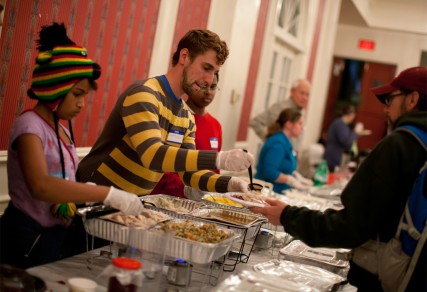
(RNS1-NOV29) Volunteer Matthew Streib, 29, part of Occupy Church D.C., serves food at the Occupy Faith D.C. Thanksgiving meal, at New York Avenue Presbyterian Church in Washington, D.C. For use with RNS-OCCUPY-FAITH, transmitted Nov. 29, 2011. RNS photo by Lauren Pond.
WASHINGTON (RNS) As Occupy camps nationwide deal with police crackdowns and the inevitable onset of winter temperatures, religious communities of all stripes are stepping in with offers of shelter and solidarity.
Soon after police forcibly evicted the original Occupy Wall Street camp in New York’s Zuccotti Park on Nov. 15, many of the protesters began sleeping and gathering in local congregations, including Judson Memorial Church in Greenwich Village.
“The eviction … really shifts what happens here, and it really boomed the movement, because immediately there was this network in place that we’d developed of communities throughout New York that were willing to open up their doors and house the movement,” said the Rev. Michael Ellick, a pastor at Judson Memorial.
Ellick and his colleagues got involved early on, marching to Zuccotti Park with a golden calf fashioned to look like the iconic Wall Street bull statue. Ever since, phones have been “ringing off the hook” with churches, synagogues, mosques, temples and monasteries wanting to get involved in some way, he said.
Various religious groups have held services at Zuccotti Park, which in turn have “re-radicalized” their congregations, Ellick said.
“Initially it was just sort of a few churches who work a lot together on these issues,” he said. “Now it’s actually a pretty hefty power base in New York City,” Ellick said.
A recent poll by the Public Religion Research Institute and Religion News Service found that less than a third of Americans say the Occupy movement represents their values, but the police evictions seem to have boosted religious support for the movement.
According to Ellick, more than 1,400 faith leaders from around the country have signed a pledge of solidarity with Occupy protesters, many of them jumping in only after police cleared Zuccotti Park.
On the other side of the country, a network of religious communities sprang up in Portland, Ore., to support Occupy Portland after police cleared the camp on Nov. 13.
Since the eviction, the city’s First Congregational Church and First Unitarian Church have hosted meetings of the movement. While many of the campers search for places to stay, First Unitarian has been housing their gear and the media tent, making the church Occupy Portland’s unofficial hub.
About 25 clergy and religious leaders spent the night before the eviction at the camp, praying and providing nonviolence counseling. The Rev. Chuck Currie, a United Church of Christ minister, was one of them.
Currie said he found the number of young people who thanked or prayed with the religious emissaries “astounding,” especially because only one in four Oregonians identify with a faith tradition.
“A number of people expressed surprise that we were there. They did not realize that the church had an interest in these issues,” Currie said.
Although surprising to some, many of the Occupy camps now have some kind of faith outreach group, prayer tent or meditation class.
About a dozen Christian activists have started an ecumenical “Occupy Church” at Washington’s Occupy K Street encampment in downtown Washington. The Occupy Church holds a prayer service every Saturday at noon and is trying to establish a full-time, rotating chaplaincy for the occupiers.
Unitarians, Muslims and Jews have also held worship services at the encampment in McPherson Square. Mimicking the New York protest, Jewish occupiers set up a tent in the square in October for the harvest festival of Sukkot.
In addition to spiritual ministry and space to assemble and sleep, religious communities have provided the Occupy movement with material support such as food, clothing, tents, blankets and heaters.
A new interfaith coalition calling itself “Occupy Faith DC” hosted a free Thanksgiving meal at a historic Washington church for about 300 of the protesters, including a small group that had just marched in from New York City.
“We understand and we are in total solidarity with you,” James Lee, one of the chief organizers of Occupy Faith DC, told the diners.
Occupy Faith DC is preparing to distribute a rapid response contact list of faith-based groups and individuals who are willing to stand in solidarity with the occupiers in the event of an eviction.
The list may be needed soon. The day after Thanksgiving, park rangers issued notices about safety and sanitation concerns to the occupiers of federally owned Freedom Plaza, a possible first step toward an eviction.
“Churches traditionally do charity pretty well,” Ellick said, “and this is a moment where that charity gets transformed into justice work and they can start to see that there are underlying causes here that we need to address.”




